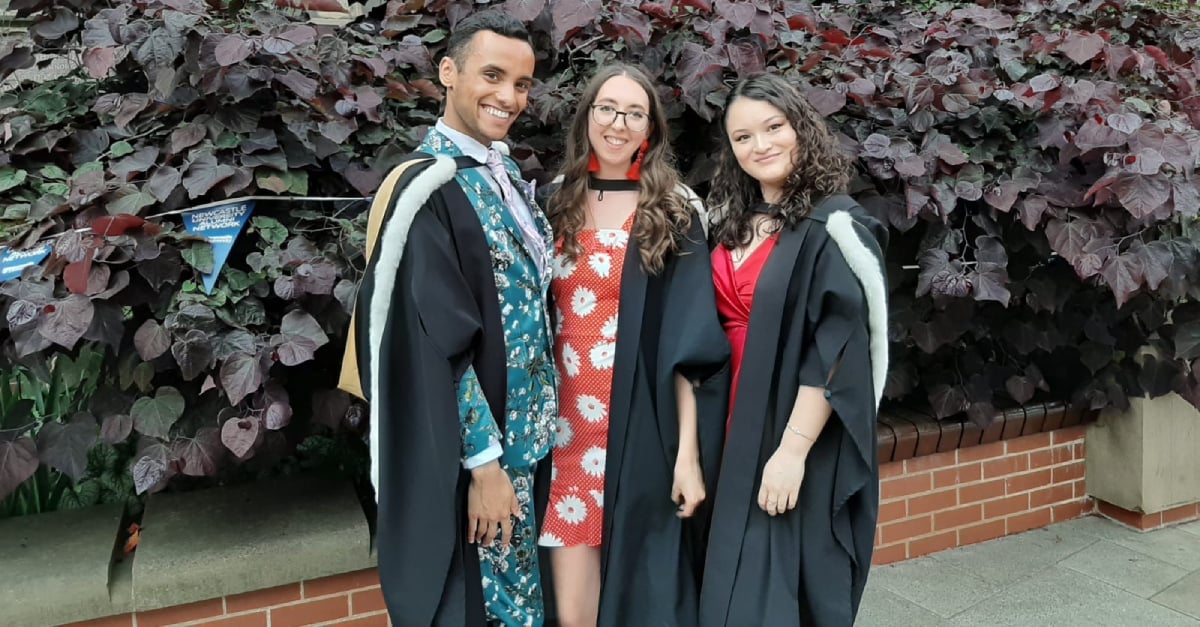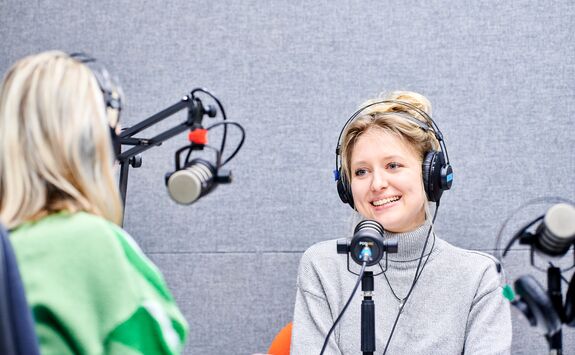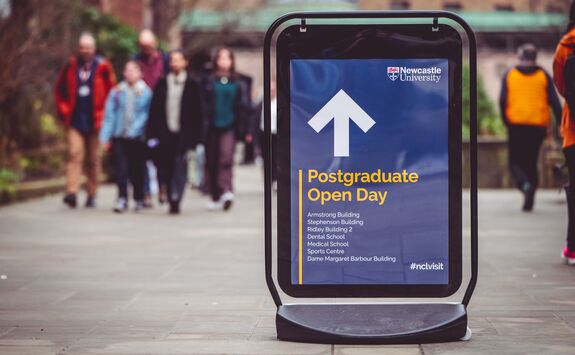Media and Journalism MA
- Study mode and duration
- Course code
- 4075F,4075P
- Fees (per year)
- Typical entry requirements
-
View full entry requirements - Course delivery
- On Campus
Course information for entry year:
Overview
Our Media and Journalism MA is for graduates and experienced journalists planning to progress to a PhD or take the next step in their career.
It provides an international context and is suitable for students from across the globe.
The course is flexible and you can tailor it towards professional media and journalism practice or academic engagement. You don't need a media background to join this course.
You'll have the opportunity to learn alongside and collaborate with professional journalists.
We work with a range of organisations to support high-quality journalism. You'll hear from and work with experts and innovators and explore advances in journalism. You'll have the opportunity to experiment and develop new ways to do journalism.
You'll also work with internationally renowned academics in media, culture, and journalism studies.
You can take part in projects to expand your knowledge and skills. This includes our Civic Journalism Lab in which we bring in industry professionals to discuss all aspects of journalism.
Important information
We've highlighted important information about your course. Please take note of any deadlines.
Please rest assured we make all reasonable efforts to provide you with the programmes, services and facilities described. However, it may be necessary to make changes due to significant disruption, for example in response to Covid-19.
View our Academic experience page, which gives information about your Newcastle University study experience for the academic year 2025-26.
See our terms and conditions and student complaints information, which gives details of circumstances that may lead to changes to programmes, modules or University services.
Quality and ranking
All professional accreditations are reviewed regularly by their professional body
If you’re studying an accredited degree and thinking about working in Europe after you graduate, the best place to find current information is the UK Government’s guidance on recognition of UK professional qualifications in EU member states. This official resource explains whether your profession is regulated in another country, what steps you need to take, and which organisation you should contact.

Media and Journalism was highly recommended to me by numerous students, specifically because of the variety of modules and being able to tailor it more for your own career direction.
What you'll learn
This journalism Master's covers key areas of knowledge and professional practice which reflect the way journalists work today. However, journalism’s role in society, how we do journalism, and careers in journalism are constantly transforming.
This course is therefore designed to be a ‘laboratory of inquiry’. It prepares you to negotiate these changes, as you progress through your career in journalism, media or professional communication. It also prepares you for further doctoral study and a career in research and academia.
Semester 1 focuses on understanding of media in regional, national and global contexts. Through independent research, you develop theoretical, critical and methodological understanding of the field. You'll begin to consider your own areas of interest and expertise. You'll also apply this understanding to creative projects. This advances your skills in multimedia journalism production.
Semester 2 focuses on individuality and creativity. You'll choose the knowledge, research and journalistic skills you want to develop further. You'll work with a research supervisor to begin producing a dissertation. You'll select optional modules that complement this process and work holistically to advance your expertise.
In Semester 3, you're immersed in advanced research practice. Working with your research supervisor, you finalise your research project.
Modules
You will study modules on this course. A module is a unit of a course with its own approved aims and outcomes and assessment methods.
The module information below is intended to provide an example of what you will study.
Our teaching is informed by research. Course content changes periodically to reflect developments in the discipline, the requirements of external bodies and partners, and student feedback.
Full details of the modules on offer will be published through the Programme Regulations and Specifications ahead of each academic year. This usually happens in May.
To find out more please see our terms and conditions.
Optional modules availability
Some courses have optional modules. Student demand for optional modules may affect availability.
How you'll learn
The one-year course is divided into three semesters. You'll have assignments to complete and submit during the intervening weeks.
We also have a series of challenging guest lectures, master classes and workshops from experts and innovators in journalism.
We adopt a student-centred policy in learning and teaching. You'll complete a combination of compulsory and optional modules through:
- lectures
- seminars
- practical workshops
Depending on your module choice, you will study three or four modules per semester. You'll work independently and collaboratively to:
- read widely
- take part in discussions
- develop topics for investigation with advice from tutors
- develop projects and presentations
- lead seminars
Depending on your modules, you'll be assessed through a combination of:
- Case study
- Design or creative project
- Dissertation
- Essay
- Oral presentation
- Portfolio
- Report
- Reflective log
- Research proposal
- Written exercise
Throughout your studies, you’ll have access to support from:
- academic staff
- personal tutors and research supervisors
- our University Student Services Team
- student representatives
- peers
You'll also be assigned an academic member of staff, who will be your personal tutor throughout your time with us. They can help with academic and personal issues.
Your teaching and learning is also supported by Canvas. Canvas is a Virtual Learning Environment. You'll use Canvas to submit your assignments and access your:
- module handbooks
- course materials
- groups
- course announcements and notifications
- written feedback
Entry requirements
The entrance requirements below apply to 2026 entry.
Qualifications from outside the UK
English Language requirements
Admissions policy
This policy applies to all undergraduate and postgraduate admissions at Newcastle University. It is intended to provide information about our admissions policies and procedures to applicants and potential applicants, to their advisors and family members, and to staff of the University.
University Admissions Policy and related policies and procedures
Credit transfer and Recognition of Prior Learning
Recognition of Prior Learning (RPL) can allow you to convert existing relevant university-level knowledge, skills and experience into credits towards a qualification. Find out more about the RPL policy which may apply to this course
Pre-Master’s and English Language courses
Need an alternative route to study this course? Our International Study Centre offers Pre-Master’s degrees and English language courses to prepare you for study.
Your future
We'll equip you with the skills and knowledge needed for a career in Journalism.
Careers
Our graduates have gone onto work as journalists for institutions such as:
- Bauer Media
- BBC
- People’s Daily, China
- Various regional newspapers
Our graduates have also gone on to gain employment in a variety of other industries, such as:
- Public Relations
- Marketing
- Recruitment
- Teaching
- Broadcasting
As an MA Media and Journalism student at Newcastle University, you'll develop a wide range of transferable skills. These range from presentation and research skills, to team-working and project management, which are highly sought after by employers.
Further study
This Media and Journalism MA provides a route into PhD level study.
Our Careers Service
Our expert Careers Service is here to help you take the next steps in your professional life. We will support you while you’re studying with us and for up to three years after you graduate.
You will have access to expert one-to-one advice and guidance through our campus careers centre and online, along with digital resources, workshops, networking opportunities, and careers and recruitment events.
We’ve been awarded 5 QS Stars for Student Employability (2025). Many of our degrees are shaped by strong links with national and international businesses. We are committed to helping you access real-world experience opportunities and develop key skills through paid work placements and internships.
Facilities
Throughout the Journalism Master's you'll have access to a range of specialist facilities.
These include:
- cameras
- voice recorders
- audio and video-editing software
- a computer-editing suite which includes Adobe CS 6
We're developing new facilities, including mobile studio equipment and editing suites. The technical support team can be found in the Old Library Building (OLB).
Fees, Funding and Scholarships
Tuition fees for 2026 entry (per year)
As a general principle, you should expect the tuition fee to increase in each subsequent academic year of your course, subject to government regulations on fee increases and in line with inflation.
Depending on your residency history, if you’re a student from the EU, other EEA or a Swiss national, with settled or pre-settled status under the EU Settlement Scheme, you’ll normally pay the ‘Home’ tuition fee rate and may be eligible for Student Finance England support.
EU students without settled or pre-settled status will normally be charged fees at the ‘International’ rate and will not be eligible for Student Finance England support. You may be eligible for a scholarship worth 25% off the international fee. Search our funding database.
If you are unsure of your fee status, check out the latest guidance here.
Scholarships
We support our EU and international students by providing a generous range of Vice-Chancellor's automatic and merit-based scholarships. See our searchable postgraduate funding page for more information.
What you're paying for
Tuition fees include the costs of:
- matriculation
- registration
- tuition (or supervision)
- library access
- examination
- re-examination
- graduation
Find out more about:
If you are an international student or a student from the EU, EEA or Switzerland and you need a visa to study in the UK, you may have to pay a deposit.
You can check this in the How to apply section.
If you're applying for funding, always check the funding application deadline. This deadline may be earlier than the application deadline for your course.
For some funding schemes, you need to have received an offer of a place on a course before you can apply for the funding.
Search for funding and scholarships
Find funding available for your course
How to apply
Using the application portal
The application portal has instructions to guide you through your application. It will tell you what documents you need and how to upload them.
You can choose to start your application, save your details and come back to complete it later.
If you’re ready, you can select Apply Online and you’ll be taken directly to the application portal.
Alternatively you can find out more about applying on our applications and offers pages.
Apply Online
Open days and events
Find out about how you can visit Newcastle in person and virtually
Overseas events
We regularly travel overseas to meet with students interested in studying at Newcastle University.
Get in touch
Questions about this course?
If you have specific questions about this course you can contact:
Barbara Henderson
Degree Programme Director
School of Arts and Cultures
Email: pgmch@ncl.ac.uk
General enquiries
For more general enquiries, you could also complete our online enquiry form.
Application enquiries
If you've got a question about your application, send us an enquiry via the application portal you applied through.
If you haven't applied yet, you can send your questions via our enquiry form.
Live chat
Our Ncl chatbot might be able to give you an answer straight away. If not, it’ll direct you to someone who can help.
You'll find our Ncl chatbot in the bottom right of this page.
Keep updated
We regularly send email updates and extra information about the University.
Receive regular updates by email
Social media
Get involved with the School of Arts and Cultures social media

